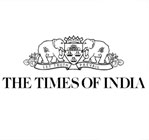-
Money Control | December, 06, 2019
Sanjeev Sanyal plain-speak: Govt not honouring contracts biggest hurdle for ease of doing business
Read More -
The Times of India | December, 13, 2018
National health insurance: 5 data analytics firms in race for fraud detection job
Read More -
The Hindu | December, 13, 2018
5 data analytics firms shortlisted for fraud detection in Ayushman Bharat scheme
Read More -
The Economic Times | December, 11, 2018
Narayana Murthy calls for cultural transformation to address developmental challenges
Read More -
Youth Ki Awaaz | October, 04, 2018
Young Social Entrepreneurs, Here’s The Chance To Amplify Your Goals
Read More -
Soko Directory | March, 02, 2018
Entrepreneurs Meet for the 5th Edition of the SANKALP Africa Summit in Nairobi
Read More

Sanjeev Sanyal plain-speak: Govt not honouring contracts biggest hurdle for ease of doing business
The government delays payments or does not deliver on promises made earlier, posing challenges to businesses, principal economic advisor to the finance minister Sanjeev Sanyal said.
Biggest constraint to doing business in the country is poor contract enforcement, and the blame for the same rests mostly with the government, a top finance ministry official said on November 26.
The government delays payments or does not deliver on promises made earlier, posing challenges to businesses, principal economic advisor to the finance minister Sanjeev Sanyal said.
Even as we have leapfrogged on the overall ease of doing business ranking, we are still ranked 163rd among 190 countries when it comes to enforcing contract, and only “dysfunctional and war-affected” countries follow us, he said.
“The biggest constraint to doing business in our country is simply the business of enforcing contracts. Unfortunately, many people have whined about it for long, but very little actual thinking has gone into it,” Sanyal told an event organised by impact investing firm Aavishkar.
The economist-turned-policymaker sought to take the blame for the same onto the government.
“In many cases, the poverty of contract enforcement relates not to two private parties, but the government which is violating these contracts,” he said, adding this happens as both the Centre and the states “violate” honouring payments or other commitments.
He assured that the present government is working on these issues through interventions like ensuring the timely payments to vendors.
“If the role of the state is to be the real sovereign, then the word of the sovereign has to be printed in gold,” Sanyal quipped.

National health insurance: 5 data analytics firms in race for fraud detection job
MUMBAI: Five IT firms, including three prominent global players, will use data analytics to detect frauds and red-flag suspicious transactions in the Centre’s health insurance programme,Ayushman Bharat, that has catered to almost 5 lakh patients across India within 80 days of its launch.
At least 14 IT majors had been vying for the job since the scheme, touted as the world’s largest government-funded health initiative, was announced.
Currently, 60% of the 15,800 empanelled hospitals are from private sector. Dr.Indu Bhushan , CEO of Ayushman Bharat, told TOI on Wednesday that frauds can’t be entirely prevented, but they will not be tolerated. “It hampers sustainability, brings bad name and once that happens we also lose political support,” he said, underlining that data will be the scheme’s biggest armour. The scheme is expected to cater to 50 crore beneficiaries, which translates into that many patient files.
He said data analysis has already allowed them to spot unusual patterns such as 77 cataract surgeries being performed in one centre in a single day, or oddly male patients undergoing “hysterectomies”. “The hysterectomies turned out to be a coding error but it shows the potential of data,” Dr Bhushan said. He added that special teams have visited suspicious centres once they were red-flagged by the data team. Around 2% of cases will undergo medical audits.

5 data analytics firms shortlisted for fraud detection in Ayushman Bharat scheme
Five players in the data and analytics field have been shortlisted to detect frauds in the Pradhan Mantri Jan Arogya Yojana (PMJAY), popularly known as Ayushman Bharat. The companies — LexisNexis, Optum, Greenojo, MFX and SAS — will compete to detect malpractice by hospitals part of the scheme for six months. The best performer among the five will be taken on board as Ayushman Bharat’s official fraud and abuse detection firm.
Dr. Indu Bhushan, CEO of Ayushman Bharat, said, “These are major companies and among the best in the world. They have a lot of experience in detecting frauds and abuse of such schemes. For the first six months, the firms will be working free of cost. Once the best company is taken on board, their team will get outcome-based payment depending on the fraud they have detected.” Dr. Bhushan was speaking at Sankalp Global Summit in Goregaon on Wednesday.
Nearly 60% of procedures under Ayushman Bharat is being carried out in the private sector. At a time when the focus should be on strengthening public hospitals by improving infrastructure and getting better services, the ambitious government scheme has been criticised for directing public money into the private sector. There have also been many reports of a spurt in certain procedures in private hospitals, patients being charged for surgeries.
Dr. Bhushan said, “We have been carrying out selective audits. Packages that are prone to frauds have been restricted to public sector hospitals. For example, mental healthcare is restricted to public hospitals. There are certain procedures that require pre-authorisation from the States. We follow up with patients randomly to keep a check as well.”

First master the art of selling: Narayan Murthy
Infosys founder N. Narayan Murthy on Tuesday said that every enterprise has to first master the art of selling, at the 10th Sankalp Global Summit, an initiative by Intellecap at NESCO in Goregaon.
Addressing budding entrepreneurs and discussing the theme of ‘Agenda 3 Billion: Building Entrepreneurial Ecosystems,’ Mr. Murthy said, “It is the most important aspect of any kind of entrepreneurship, second is finance. Obtain better returns for your investors. Then you need a team with various strengths, technology and lastly, without luck, it is very difficult to succeed.”
The Infosys founder said that the what India needs is cultural transformation through honesty and discipline.
Speaking on the occassion, Niti Aayog CEO, Amitabh Kant said that in India, we have travelled the journey of opening a bank account in 10 months to now to 55 seconds using biometrics, when we use instruments like Aadhar.
“The process of urbanisation provides unlimited opportunities to entrepreneurs in India and across the world to use technology and innovation to tackle our immense challenges,” Mr. Kant said.

Narayana Murthy calls for cultural transformation to address developmental challenges
Infosys co-founder NR Narayana Murthy Tuesday called for a cultural transformation to address the big developmental challenges facing the country.
Addressing an event, Murthy said transformation in terms of honesty, discipline, and caring for the underprivileged is necessary for achieving overall development.
“Every enterprise has to first master selling as it is the most important aspect of any kind of followed by finance where you have to offer better returns to your investors. Also, you need a team with complementary strengths including technology and lastly luck.
“But the most important thing that we need today is a cultural transformation marked by qualities like honesty and discipline,” Murthy said addressing the Sankalp global summit
He also noted that leaders of capitalism in every major country have to come together and work together to show the rest of the world how they can show self-restraints and how they ensure there is reasonableness in their lifestyle.

Young Social Entrepreneurs, Here’s The Chance To Amplify Your Goals
The adoption of Sustainable Development Goals: Agenda 2030 has globally generated momentum in working towards inclusive development for a sustainable tomorrow. Across the spectrum, extending from the public to the private sector, conversations centered on the 5Ps – people, prosperity, peace, partnership and planet that form the foundations of the 17 Goals are in focus to create impact.
These goals include 169 defined targets cutting across sectors to achieve zero poverty, zero hunger, good health and well-being, quality education, gender equality, clean water and sanitation, affordable clean energy, decent work and economic growth; among others.
An important part of this global vision is the role of youth for realization of these goals. An UNDP report in 2017, Youth as Partners for the Implementation of the SDGs, estimated that over one third of the 169 SDG targets highlight the role of young people and the importance of their empowerment, participation, and well-being. 20 targets across six SDGs are strongly focused on youth: Zero Hunger, Quality Education, Gender Equality, Decent Work and Economic Growth, Reduced Inequalities, and Climate Action. Further, the YouthSpeak global survey of 180,000 young people showed 68% believe the world will be a better place by 2030.
With changing aspirations, young people are optimistic and increasingly willing to come forward and contribute to social transformation. Young minds in governance, entrepreneurship, investing circles, corporate world understand the need to proactively engage and involve themselves with the accomplishment of this ambitious agenda. A recent report by Ernst and Young,”Sustainable investing – the millennial investor”, suggests that the demand for sustainable investments is being driven, in part, by millennials who prefer to invest in alignment with personal values. At the same time, responsible global citizenship has extended into business solutions that are aimed at tackling development challenges.
Social entrepreneurship among the youth is also seeing a powerful positive trend. Current demographic trends, coupled with the challenge of unemployment in the traditional job market, are pushing the youth to explore alternative avenues and tap into their entrepreneurial skills. There is a renewed commitment to influence impact and a willingness to take risks. Harnessing this energy, young entrepreneurs are looking to balance and optimize the profit and purpose equation.
Several initiatives globally, and in India are encouraging young minds to ideate and innovate. Business federations, large corporations, accelerators, incubators, management schools and governments are some key stakeholders in this ecosystem, who through their multiple programs are pushing for cutting edge business solutions. The NITI Ayog’s Atal Tinkering Labs, Villgro’s iPitch, TATA Social Enterprise challenge are some notable ones to name a few. State governments across the country are also encouraging innovation with dedicated support to such entrepreneurs.
Whether it is competitions, mentorship programs, or awards – the recognition that there is a need to reinvent the wheel by endorsing innovative thinking is widely accepted. It is at the heart of all such initiatives that celebrate and support businesses contributing to driving social change.
While in recent years, there has been an enormous upsurge in using business to create social impact, there also remain many stories of failed attempts. This also needs to be addressed. It necessitates a deepening of the discourse around youth entrepreneurship to understand what can be done to make these ideas, innovations and solutions sustainable and viable. It is imperative to approach the problem holistically, and see to it that the stories of impact are not short term successes riding the wave. An ecosystem facilitating good mentorship, upskilling, collateral specialized support services is fundamental to sustainable business building. It is only through such sustainability that long lasting impact is created that shall eventually lead to the accomplishment of the 17 SDG Goals set out.
The Sankalp Global Summit, as one of India’s largest inclusive development and impact investing platforms, recognizes that the ecosystem approach lies at the core of celebrating entrepreneurship. It aims to build consensus and facilitate dialogue with some of the most relevant stakeholders for solving emerging challenges across high impact sectors.
The Sankalp Awards, as a part of the Summit convening seeks to support, engage, and recognize high potential enterprises tackling development challenges. The program is designed to support emerging social enterprises by strengthening their business strategies, providing fund raising opportunities and access to a global network of investors
Established as one of India’s most prestigious social enterprise awards, since 2009, Sankalp Awards has recognized more than 1500 social enterprises, facilitated 500 + mentoring connections and raised more than USD $250 million equity investment.

There is a need to grow all of India: Sunil Munjal
When it comes to impact investing, Sunil Munjal, chairman of Hero Enterprise, is the newsmaker of 2017. In April, Munjal wrote a cheque of ₹100 crore to Aavishkaar, an early-stage, social venture capital firm. The investment, dubbed the biggest such by an Indian HNI, was part of Aavishkaar’s ₹2,000-crore Aavishkaar Bharat Fund to bankroll startups as well as other companies that operate in sectors such as agriculture, financial services, renewable energy and health care.
The 57-year-old entrepreneur, who moved out of his family’s flagship company Hero MotoCorp in 2016, is also a votary of India’s traditional arts and crafts. “If it can be branded and positioned appropriately, it will truly build India’s soft power,” Munjal tells Forbes India in an interview.

DBS Foundation Dukung Pengembangan Kewirausahaan Sosial

WE Online, Jakarta – DBS Foundation memberikan dukungan terhadap kegiatan Sankalp Southeast Asia Summit 2015 sebagai bagian dari upaya untuk memantapkan hubungan jangka panjang dalam rangka mengembangkan ekosistem untuk wirausaha sosial (social enterprise/SE) di kawasan Asia Tenggara.
Head of DBS Foundation Patsian Low menjelaskan pihaknya memiliki fokus dalam membangun masa depan yang baik untuk Asia dengan cara memajukan SE, sebuah bisnis yang berkembang secara mandiri dengan cara yang kreatif dan efektif dalam menyelesaikan permasalahan sosial.
“Untuk mendukung SE, kami mencoba untuk membagikan warisan yang kami miliki sebagai bank yang berkembang dan di saat yang sama kami mendayagunakan keahlian kami dalam melayani sektor SME. Kami sudah bekerja sama dengan beberapa SE di Singapura, India, Indonesia, Tiongkok, Taiwan, dan Hong Kong,” katanya dalam rilis pers yang diterima di Jakarta, Sabtu (21/11/2015).
Patsian mengatakan inti tujuan dukungan tersebut tidak hanya untuk membangun kesadaran dan advokasi kepada para pelaku SE serta program yang ditujukan untuk membantu merealisasikan ide-ide cemerlang serta bermanfaat secara sosial, tetapi juga untuk mendidik dan memperkuat inovasi pada pelaku SE melalui penyuluhan, pendanaan, dan dukungan dari para relawan-relawan yang berbakat.

Entrepreneurs Meet for the 5th Edition of the SANKALP Africa Summit in Nairobi
Over 1,000 entrepreneurs have met in Nairobi for the 5th edition of the SANKALP Africa Summit.
This year’s theme is ‘Open Alliance for a Sustainable and Inclusive Africa 2030’, which revolves around the Sustainable Development Goals and how various partners can work together to achieve these goals with the private sector.
On the first day of the summit, stakeholders from across the impact investing ecosystem deliberated on strategies for building partnerships and collaborations to drive the sustainability and inclusion agenda in Africa.
The summit will highlight what has been achieved so far and delve deeper into the untapped opportunities presented by the SDGs in Africa for the entrepreneurs, corporates and the development community.
Each year the Summit recognizes high potential entrepreneurs and this year,10 enterprises were competing for the coveted Sankalp Africa Award with iNuka Pap emerging victorious.
iNuka Pap is a mobile lending and payment platform that allows members of rural credit unions access timely loans and convenient payments.
The second place went to KopaGas; the enterprise has developed the world’s first commercially tested LPG smart meter for household use which incorporates a pay-as-you-cook model. KopaGas also delivers high quality and reliable supply of LPG and has grown to become the third largest (by volume) distributor in Tanzania over its years of operations.
Third place went to Mhogo Food; the enterprise processes multipurpose and affordable gluten-free Cassava flour for sale to the low and middle-income earners in Africa and is planning on introducing cassava Chips as one of its product offerings.
Winners from previous years have gone on to raise over $500,000 in investments.
How can we ensure a future where quality education, affordable healthcare and livelihoods are the new social defaults as defined in the drive towards achieving the Sustainable Development Goals? Can we commit to making choices today to ensure a sustainable and inclusive future for all?
The SANKALP Africa Summit brings together carefully curated entrepreneurs, innovators, investors, corporates, academics, policymakers, and other thought-leaders from around the globe to discuss these and other complex questions under the framework of Goal 17 of the SDGs.
The Summit drives these exciting discussions, which have been structured in various formats like masterclasses and panel sessions, and address key topics areas like financing towards attaining the goals, building sustainable impact-based enterprises, forging collaborative partnerships, and imagining the future beyond the goals themselves.
The Summit is supported by key partners such as World Bank, Doen Foundation, Miller Center, Kenya Climate Innovation Center, BMW Foundation, IDRC and several others who champion innovation, entrepreneurship, and impact investing for a sustainable and inclusive Africa.

Invest in creative art economy, Kenyans urged
The government and private sector have been urged to consider investing in the creative art economy. This came out during the fifth Sankalp Africa Summit 2018 held in Nairobi.
Creative investment includes investing in arts, artistes, musicians, and graffiti people among other talents which the youth possess. This kind of investment is wanting because it has not been taken with the seriousness it deserves in Kenya.
“There is great opportunity which is yet to be tapped in the creative investment sector in Kenya which contributes to the bigger economy because the ideas are converted into products and services of the whole economy.,” Godown arts centre executive director Joy Mboya said.
On his part Boniface Mwangi, an activist said that the government should support the creative industry because the arts in Kenya lack government investment and support. It should work hand in hand with the private sector to boost creative economy because lack of support has driven up unemployment as youth sleep on their talent.
“Denmark has always worked with the Kenyan government in many projects and we will continue supporting it to create more job opportunities to its youth through promoting various innovations,” Danish ambassador to Kenya Mette Knudsen said.
The forum aims at connecting entrepreneurs with investors, corporates and policy makers to facilitate growth strategies for the region.
Kenya’s pap-mobile money access, Kopa gas from Tanzania and mhogo food emerge first, first runner up and second runner up consecutively in the innovations competition.
Reports & Policies
Our Impact Map

Sign up for our newsletter
© Copyright 2018 Intellecap Advisory Services Pvt. Ltd. - All Rights Reserved




